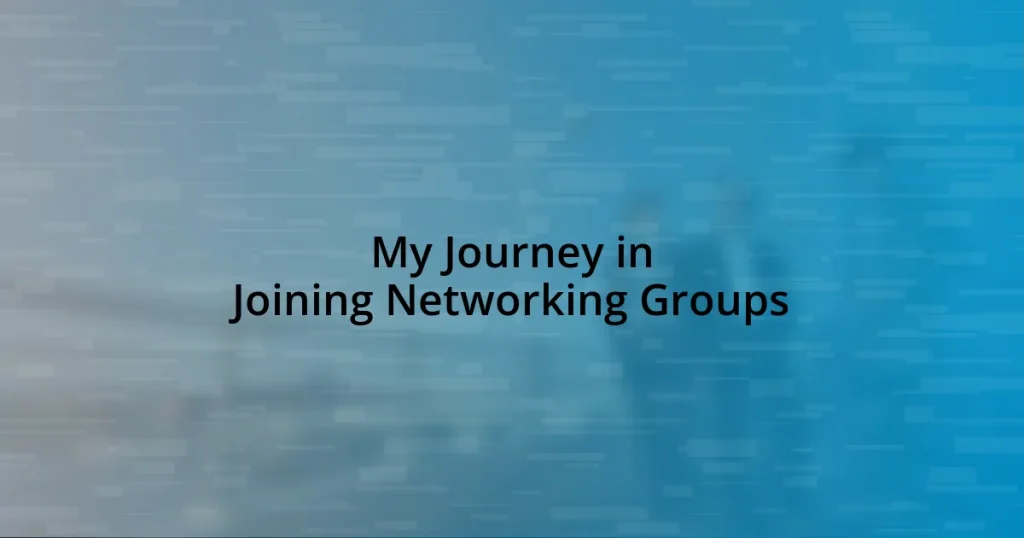Key takeaways:
- Networking groups foster diverse perspectives and informal interactions that can lead to meaningful relationships and collaborations.
- Key benefits of joining include access to opportunities, mentorship, skill development, and a supportive community.
- Engaging authentically and following up post-events is crucial for nurturing professional connections.
- Measuring success in networking focuses on quality of relationships and opportunities created, rather than just the number of contacts made.
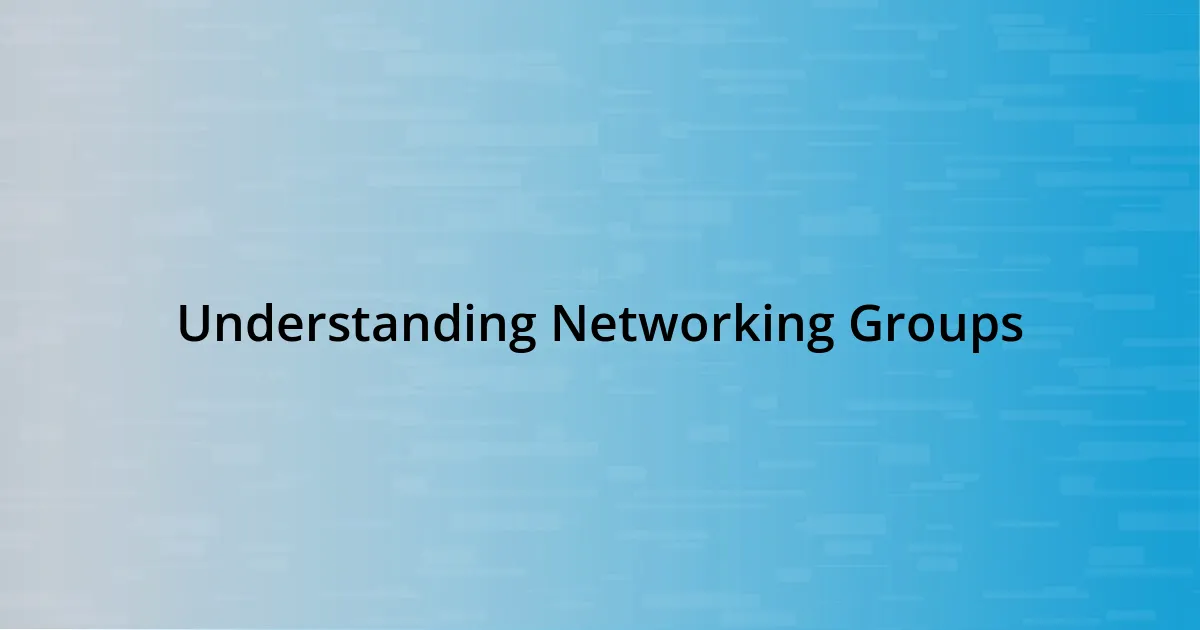
Understanding Networking Groups
Networking groups are essentially communities where individuals come together to share resources, knowledge, and opportunities. I remember my first experience stepping into one of these gatherings; the air felt charged with potential. Have you ever walked into a room full of strangers and felt that tingle of excitement mixed with a bit of anxiety? It’s a unique setting where vulnerability meets ambition.
One of the most powerful aspects of networking groups is the diversity of perspectives you encounter. For instance, I met a woman at a local group who had shifted careers after years in a completely different field. Her journey inspired me and reminded me that connections can lead to unexpected insights. Isn’t it fascinating how people from various backgrounds can come together, each bringing their own stories and experiences?
Often, the real magic happens in informal interactions rather than structured sessions. I vividly recall a casual chat over coffee that led to a collaborative project in my field. How often do we underestimate the power of relaxed conversations? Networking groups thrive on those moments, creating an environment where genuine relationships can blossom and, ultimately, transform our professional lives.
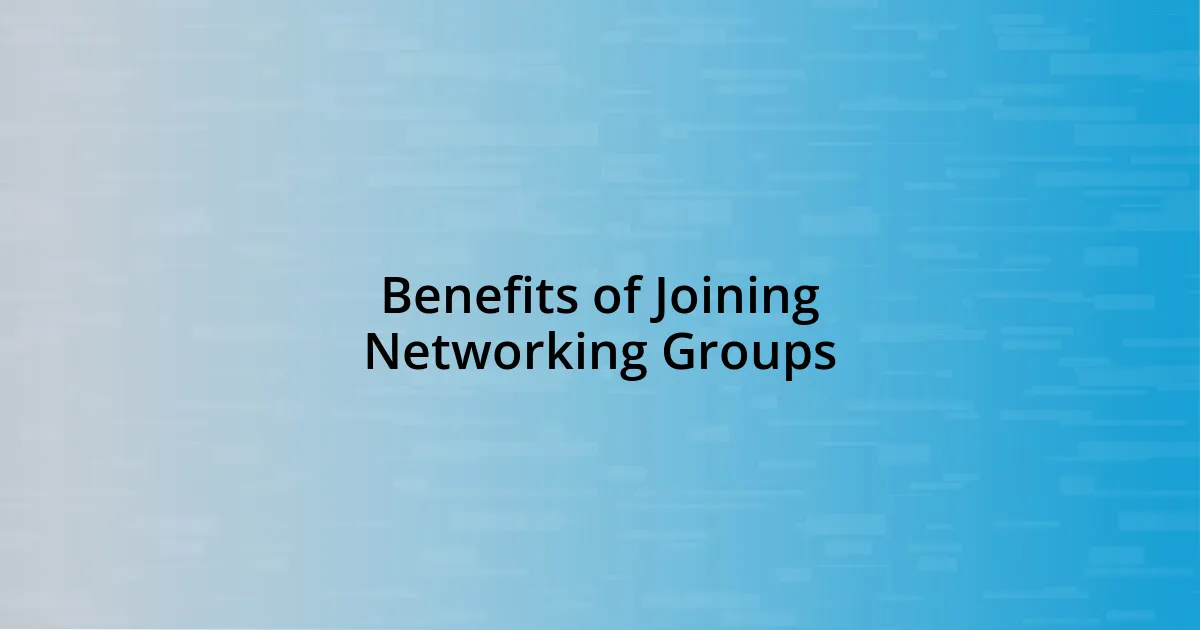
Benefits of Joining Networking Groups
Joining networking groups brings a host of benefits that can profoundly impact your career and personal growth. One of the standout advantages I found is the opportunity for mentorship. I remember meeting a seasoned professional at one such group who took the time to share her journey and offered invaluable advice on navigating career challenges. That mentorship not only provided guidance but instilled a sense of confidence I didn’t know I needed.
Here are some key benefits to consider:
- Access to Opportunities: Networking groups are often the first place where new job openings or project collaborations are shared.
- Skill Development: Many groups host workshops or seminars, making it easy to learn new skills in a supportive environment.
- Increased Visibility: Regular participation helps raise your profile in your industry, making you a go-to person for ideas and insights.
- Supportive Community: You’re surrounded by like-minded individuals who understand the struggles and joys of your professional journey.
- Diverse Perspectives: Interacting with people from different fields or backgrounds opens your mind to innovative solutions and ideas.
Another remarkable benefit I experienced was the sheer sense of belonging. There was a particular networking event where I connected with someone who shared my passion for social entrepreneurship. It felt refreshing to converse openly about my aspirations without the fear of being judged. The energy of shared goals can turbocharge your motivation and vision in ways you might never anticipate.
As you navigate your own journey, remember that networking groups can transform not just what you know but who you know—and who you become in the process.
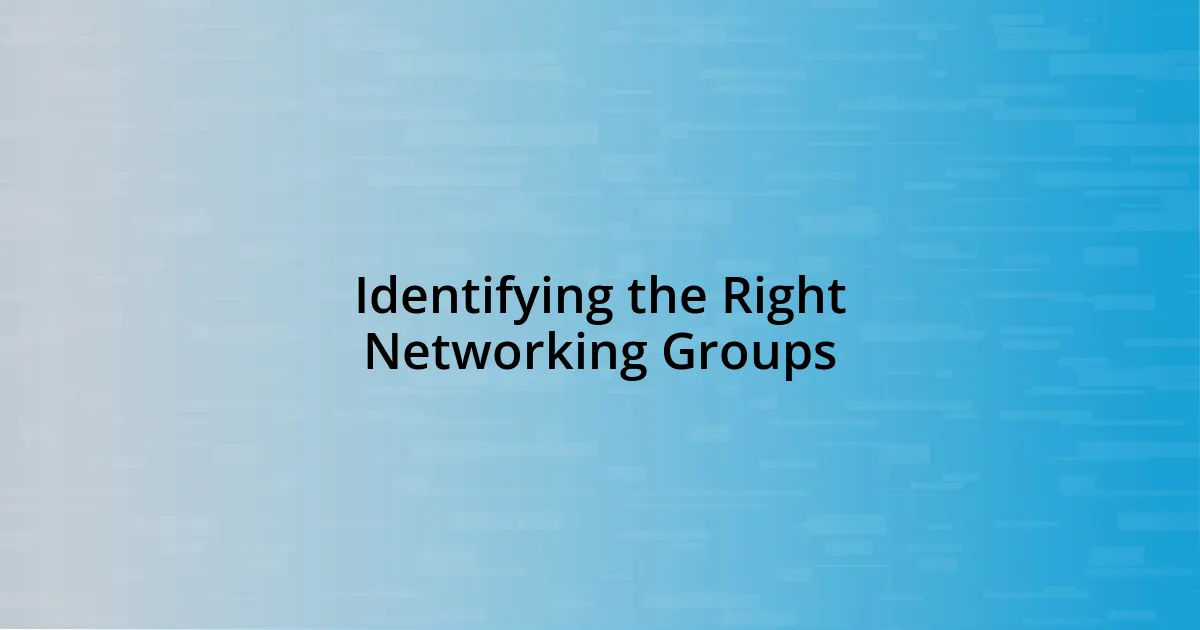
Identifying the Right Networking Groups
Identifying the right networking groups is crucial for making meaningful connections. For me, it started with understanding my personal goals. I asked myself questions, like, “What do I want to gain from this experience?” and “Which industries resonate with my aspirations?” This process pushed me to explore groups that aligned with my interests, leading to more relevant conversations and collaborations.
Another key aspect is the importance of aligning with the group’s culture. I vividly remember walking into a group that boasted a laid-back atmosphere, yet I quickly realized the members were highly driven and focused. The contrast was striking, and I found it challenging to engage meaningfully. Assessing a group’s culture through social media or introductory meetings can save time and ensure that you connect with like-minded individuals.
Additionally, exploring diverse opportunities within networking groups has been invaluable in my journey. I’ve attended large events where the energy was palpable, but I’ve also found immense value in smaller, more intimate gatherings. Each type offers unique networking dynamics. A blend of both can provide a well-rounded experience, helping you grow and connect on different levels.
| Criteria | Large Networking Events |
|---|---|
| Atmosphere | High energy, often chaotic |
| Opportunities | Many connections, less depth |
| Follow-Up Possibilities | Challenging, often overwhelming |
| Engagement Type | Surface-level conversations |
| Networking Style | Presentations and speed networking |
| Criteria | Small, Intimate Gatherings |
| Atmosphere | Relaxed and personal |
| Opportunities | Fewer connections, more depth |
| Follow-Up Possibilities | Easier to keep in touch |
| Engagement Type | Deeper discussions |
| Networking Style | Casual and conversational |
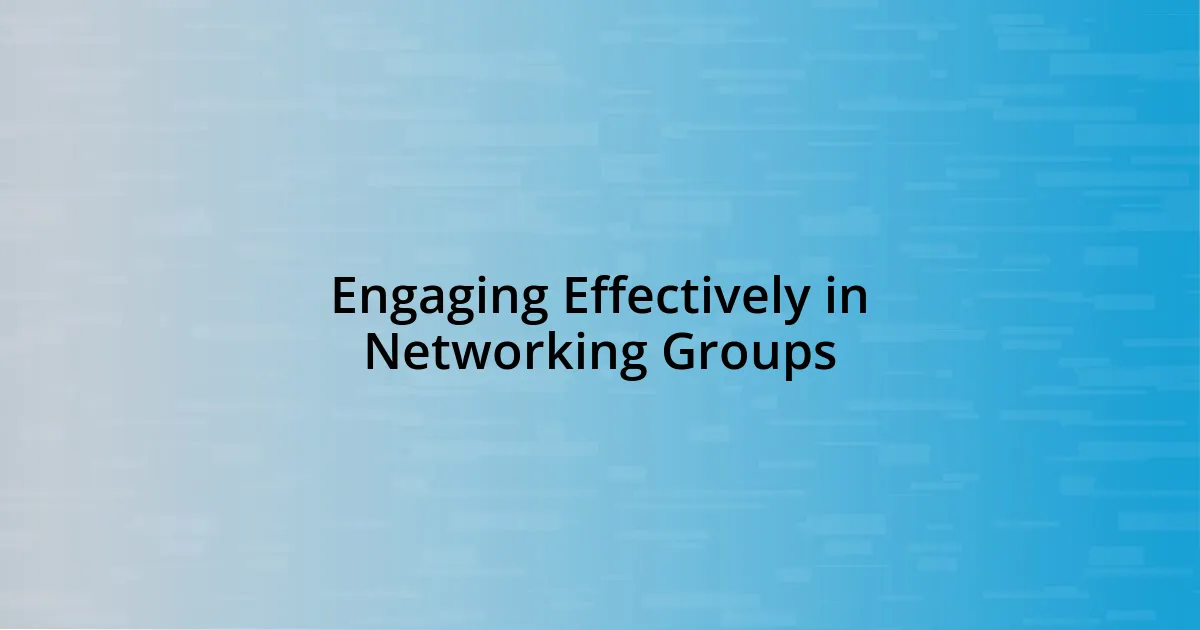
Engaging Effectively in Networking Groups
Engaging effectively in networking groups starts with showing genuine interest in others. I recall a time when I made it a point to ask open-ended questions rather than focusing solely on my agenda. This shift not only sparked meaningful conversations but also revealed common interests that often led to exciting collaborations. Have you ever had a discussion that changed your perspective entirely? That’s the power of true engagement.
Another essential aspect is following up after events. Early in my networking journey, I often overlooked this step. However, I learned quickly that the real magic happens in the follow-up. I remember connecting with someone over coffee after a group session, and that casual meeting blossomed into a lasting professional relationship. It taught me that a brief conversation can serve as the foundation for future opportunities, providing a deeper layer to my network.
Lastly, being authentic can’t be overstated. I once attended an event where I felt pressure to impress others with my achievements. However, when I allowed myself to share my vulnerabilities, like facing burnout, the response was overwhelmingly supportive. It was a reminder that authenticity resonates with people; they want to connect with the real you, not just your success stories. What are you holding back that could foster a deeper connection? Embracing authenticity can truly enhance your networking experience.
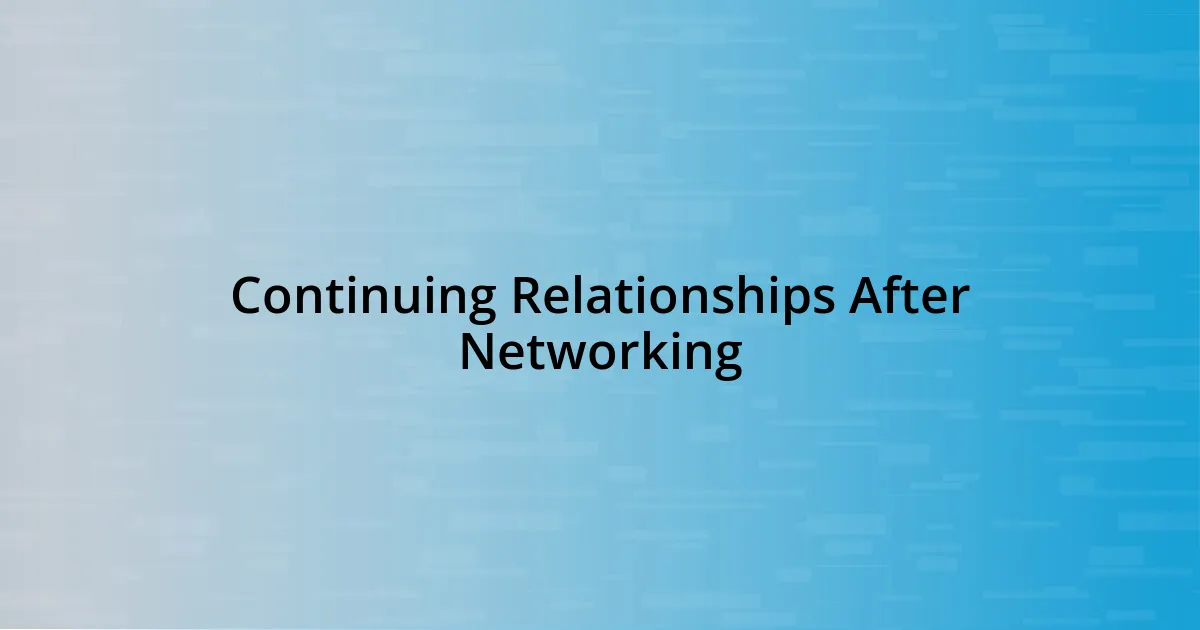
Continuing Relationships After Networking
Continuing relationships after networking requires a conscious effort to nurture those connections. I remember a time when I reached out to someone I met at a conference several months later. It felt a bit daunting, but I shot them a simple message asking how their latest project was going. To my surprise, they responded enthusiastically, and we ended up scheduling a virtual coffee chat. That small gesture opened the door to an ongoing collaboration that has been incredibly rewarding for both of us.
One thing I’ve learned is that consistency is key. After those initial conversations, I make it a habit to check in with my contacts regularly. Whether it’s sharing an article they might find interesting or simply asking about their latest endeavors, staying present in their minds creates a lasting bond. Don’t you find that a little touch can often deepen a connection? By making the effort, I not only foster relationships but also position myself to support and be supported in return.
Of course, being proactive also means knowing when to step back. There was a time when I felt the pressure to always reach out, but I soon realized that relationships ebb and flow. It’s not about constant communication but about being genuine when it matters. Reflecting on my experiences, I learned that being there during significant moments—like offering congratulations on a new job or empathy during tough times—will solidify those ties far more than routine check-ins. What are those moments you could be more present for in your network?
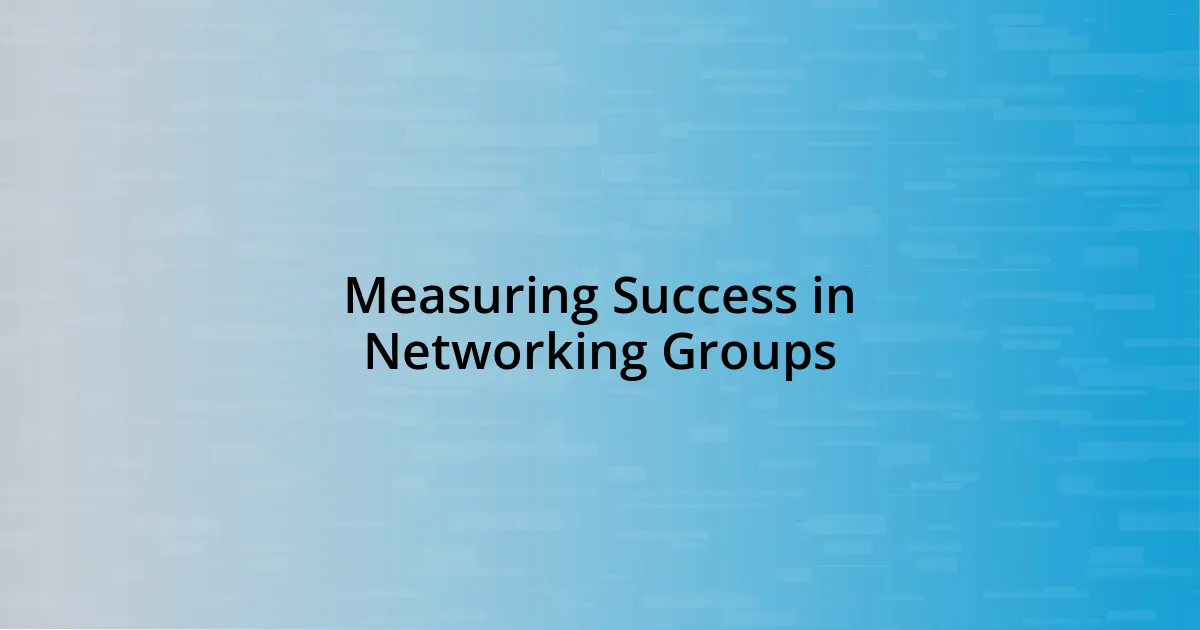
Measuring Success in Networking Groups
Measuring success in networking groups goes beyond just the number of business cards exchanged. For me, it’s all about the quality of relationships developed. I remember attending a networking event where I only connected with a handful of individuals, but those conversations felt genuine and engaging. It hit me that sometimes a few meaningful connections are far more valuable than a large crowd of acquaintances. How do you define quality in your networking?
I also find that tracking the opportunities that arise from networking is essential. After joining a group, I started to keep a simple log of follow-up meetings and referrals. One time, I noted that an introduction I made resulted in a successful project launch for a fellow member. Reflecting on that success, I realized that every interaction could hold the potential for collaboration if nurtured properly. Isn’t it satisfying to see your network bloom into something tangible?
Moreover, I frequently assess how my engagement evolves in these groups. I’ll sometimes pause to examine how many members I’ve supported or inspired along the way. During one of my networking trips, I helped two strangers from different sectors connect over lunch. Later on, they both credited me for their partnership, which resulted in a great initiative. Moments like that remind me that measuring success isn’t just about personal gain; it’s about how you contribute to the network as a whole. How can you turn your knowledge into a gift for others?









